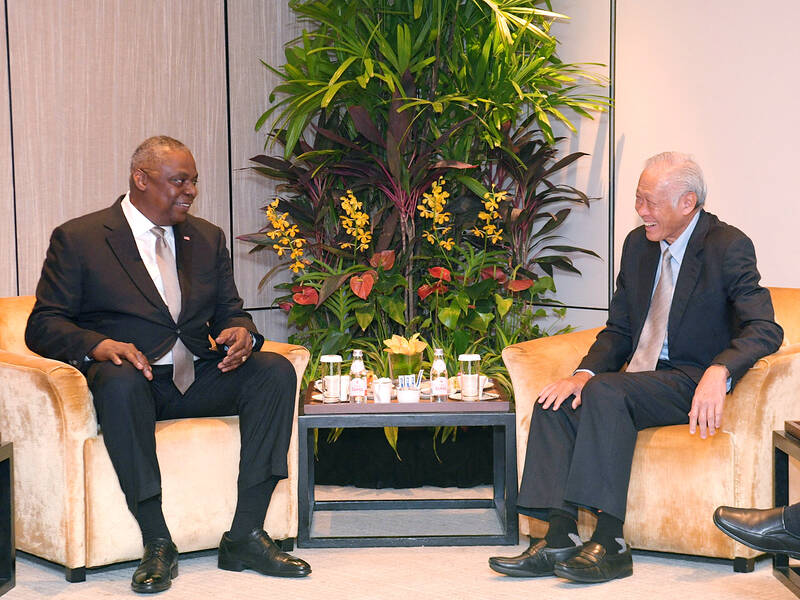As the US and China vie to establish new partnerships and expand influence with nations in the Asia-Pacific region, top defense officials from both countries are preparing to win support from their regional counterparts, diplomats and leaders at a security forum in Singapore this weekend.
Australian Prime Minister Anthony Albanese, whose country is a stalwart US ally in the Pacific region, was to give the keynote address yesterday evening to open the dialogue at the Shangri-La Hotel hosted by the International Institute for Strategic Studies.
Albanese, whose country has angered Beijing with its agreement with the UK and the US, known as AUKUS, to obtain nuclear-powered submarines to address a perceived rising threat from China, said that he would focus on Australia’s deepening engagement, as well as “shared opportunities and challenges” in the region.

Photo: Reuters
“We want a region that is stable, peaceful, resilient and prosperous,” he said when his speech was announced.
This year’s dialogue comes amid a wide range of issues, including the war in Ukraine and its regional implications, China’s support for Russia, the conflict in Myanmar, and growing tensions between China and the US over Beijing’s claims to Taiwan.
US Secretary of Defense Lloyd Austin would today give an opening speech on US “leadership in the Indo-Pacific,” the Pentagon said.
Chinese Minister of National Defense Li Shangfu (李尚福) would tomorrow lead with a speech on his country’s new security initiatives.
Austin began his trip to the region in Japan, where Japanese Prime Minister Fumio Kishida has been one of the most outspoken leaders in Asia against the Russian invasion of Ukraine.
Kishida has ramped up Japan’s defense spending, and cautioned others at the Shangri-La forum last year that “Ukraine today may be East Asia tomorrow.”
China has refused to criticize Russia’s invasion of Ukraine, and has blamed the US and NATO for provoking Moscow.
During a trip in April to Moscow, Li pledged to expand military cooperation, military-technical ties and the arms trade with Russia.
“We will certainly take them to a new level,” he said at the time.
On the sidelines of the conference in Singapore, Austin plans to meet with “key leaders to advance US defense partnerships across the region in support of our shared vision for a free and open Indo-Pacific anchored in ASEAN centrality,” the US Department of Defense said.
Following the conference, Austin would travel to New Delhi to meet with his Indian counterpart for talks on issues including expanding “operational cooperation between the US and Indian militaries,” it said.
Like the US, many of its allies have been increasing their focus on the Indo-Pacific region, and the conference brings together many top officials, including defense ministers from Australia, Canada, Germany, Japan, the Netherlands, New Zealand, South Korea, Sweden, the UK and Ukraine.

The CIA has a message for Chinese government officials worried about their place in Chinese President Xi Jinping’s (習近平) government: Come work with us. The agency released two Mandarin-language videos on social media on Thursday inviting disgruntled officials to contact the CIA. The recruitment videos posted on YouTube and X racked up more than 5 million views combined in their first day. The outreach comes as CIA Director John Ratcliffe has vowed to boost the agency’s use of intelligence from human sources and its focus on China, which has recently targeted US officials with its own espionage operations. The videos are “aimed at

STEADFAST FRIEND: The bills encourage increased Taiwan-US engagement and address China’s distortion of UN Resolution 2758 to isolate Taiwan internationally The Presidential Office yesterday thanked the US House of Representatives for unanimously passing two Taiwan-related bills highlighting its solid support for Taiwan’s democracy and global participation, and for deepening bilateral relations. One of the bills, the Taiwan Assurance Implementation Act, requires the US Department of State to periodically review its guidelines for engagement with Taiwan, and report to the US Congress on the guidelines and plans to lift self-imposed limitations on US-Taiwan engagement. The other bill is the Taiwan International Solidarity Act, which clarifies that UN Resolution 2758 does not address the issue of the representation of Taiwan or its people in

US Indo-Pacific Commander Admiral Samuel Paparo on Friday expressed concern over the rate at which China is diversifying its military exercises, the Financial Times (FT) reported on Saturday. “The rates of change on the depth and breadth of their exercises is the one non-linear effect that I’ve seen in the last year that wakes me up at night or keeps me up at night,” Paparo was quoted by FT as saying while attending the annual Sedona Forum at the McCain Institute in Arizona. Paparo also expressed concern over the speed with which China was expanding its military. While the US

SHIFT: Taiwan’s better-than-expected first-quarter GDP and signs of weakness in the US have driven global capital back to emerging markets, the central bank head said The central bank yesterday blamed market speculation for the steep rise in the local currency, and urged exporters and financial institutions to stay calm and stop panic sell-offs to avoid hurting their own profitability. The nation’s top monetary policymaker said that it would step in, if necessary, to maintain order and stability in the foreign exchange market. The remarks came as the NT dollar yesterday closed up NT$0.919 to NT$30.145 against the US dollar in Taipei trading, after rising as high as NT$29.59 in intraday trading. The local currency has surged 5.85 percent against the greenback over the past two sessions, central